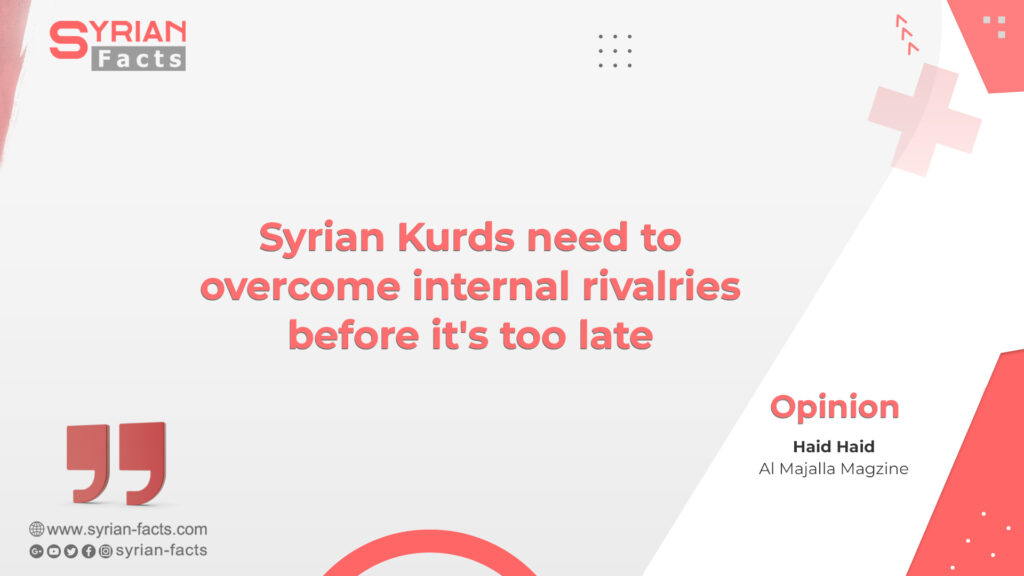Political developments in the region have not been favourable for the Kurdish-led autonomous administration in Syria, which currently controls around one-quarter of the country.
The ongoing efforts for regional normalisation with the regime of Bashar al-Assad, coupled with Turkish President Recep Tayyip Erdogan’s electoral victory and his attempts to reconcile with al-Assad, have further diminished the prospects of a deal between Qamishli and Damascus.
Despite the gloomy outlook and the lack of strategic allies, rivalries among Kurdish political parties continue to fester.
These internal strifes not only jeopardise the administration’s long-term survival but have also led to the suspension of the main border crossing in north-east Syria, exacerbating the already challenging situation in a region besieged by adversaries.
.
The Fishkhabour-Semalka crossing with Iraq, dominated by the Kurdistan Democratic Party, was abruptly closed on 17 May, with no indication of when it will reopen.
Critical lifeline
This crossing serves as a critical lifeline for north-eastern Syria, facilitating trade, political delegations, and the entry of non-governmental organisations into the region. Its closure has significant implications for the approximately 3 million people residing under the authority of the autonomous administration.
Although no official explanation was issued regarding the closure of the crossing, the Kurdish National Council — a coalition of parties opposing the Autonomous Administration and aligned with the Kurdistan Democratic Party — claimed it was in response to the Autonomous Administration preventing some of their members from exiting Syria to attend the inauguration of the National Museum, an event to which they were invited by the Kurdistan Democratic Party.
Efforts were made by the US delegation in north-east Syria to mediate between the two parties and prevent any further escalation between the Autonomous Administration and the Kurdistan Democratic Party.
However, despite a week of intensive attempts, these efforts reportedly proved unsuccessful, resulting in the closure of the crossing.
While the authorities on each side of the crossing have not officially confirmed this account, it is worth noting that previous conflicts between the two parties have previously led to the closure of the crossing on multiple occasions in recent years.
Unsuccessful reconciliation attempts
As recent developments have demonstrated, intra-Kurdish tensions have remained unresolved despite extensive and frequent mediation efforts between rival groups.
.
Reconciliation talks between the Kurdish National Council and the Democratic Union Party — both integral factions within the Autonomous Administration — were first initiated in 2012 with the backing of Kurdistan Region President Massoud Barzani.
However, despite reaching multiple agreements or being on the verge of doing so, all these endeavours have been thwarted before reaching a successful outcome.
The most recent and significant unity talks were initiated by Mazlum Kobane, the commander in chief of the US-backed Syrian Democratic Forces, following Turkey’s seizure of the border towns of Ras al-Ain and Tell Abyad in 2019.
The objective was to ease tensions, gain broader legitimacy for the autonomous administration, and present a united front in negotiations with Damascus.
These talks, which were also sponsored by the US, successfully outlined a shared political vision between the Kurdish National Council and the Democratic Union Party.
However, they eventually faltered and failed to reach a final agreement. In a recurring cycle of déjà vu, both sides attributed blame to each other for the breakdown, resulting in a divided and weakened Kurdish political landscape.
Mutual accusations
The Kurdish National Council has consistently accused the Kurdistan Workers Party —believed to have connections with the PYD — of undermining the talks, while the autonomous administration has accused the former of retracting their commitment under Turkish pressure.
These accusations likely hold elements of truth, as the repeated failures can be attributed to internal divisions between pragmatists and hardliners within each Kurdish faction.
The pragmatists, who prioritise reaching a deal above all else to secure their survival, typically take the lead in the initial stages of unity talks. However, their efforts have consistently been thwarted by the hardliners, derailing any progress towards an agreement.
These internal divisions have also hindered the autonomous administration and Syrian opposition groups from establishing a unified stance.
While one group remains a staunch adversary of Turkey and the other is seen as an ally, their respective futures are — to varying degrees — dependent on the outcome of ongoing talks between Ankara and Damascus. Both stand to lose significantly if Erdogan and al-Assad manage to find common ground.
.
Recently, the Kurdistan Regional Government partially reopened the Fishkhabour-Semalka crossing, but persistent intra-Kurdish divisions pose a significant risk of its closure once again.
Instead of actively pursuing new alliances to strengthen their future position, Syrian Kurds seem to be consumed by their internal differences, disregarding the heightened threats that jeopardise all the de-facto gains they have achieved thus far.
Al Majalla Magzine





Be the first to write a comment.